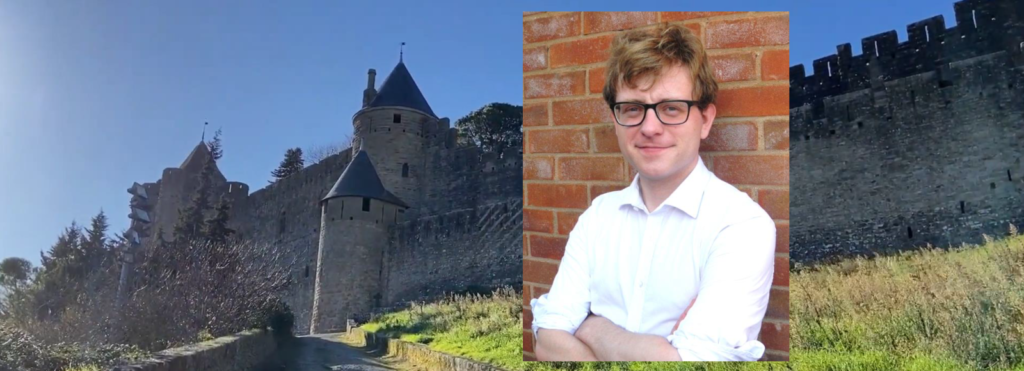- ...
Masters Compare - Find your perfect masters course.

Hearing first hand others’ experiences can help you decide if a PhD is right for you. Following a path to a PhD and tips to help you get there from those who’ve done it can be really helpful.
We had a chat with Edward, a Modern Languages graduate, who then completed a Masters in Medieval Studies before undertaking a PhD in Medieval French at Exeter. Find out how he decided a PhD was the right for him. Edward shares how he overcame bumps along the way to be able to call himself a Doctor; even more impressive given his late autism diagnosis.
My interest in medieval French literature was piqued during an undergraduate module, which led me to specialise in this area for my final undergraduate dissertation. The thing that made me think postgraduate study was a route which may be right for me, was when discussing my undergraduate dissertation, it felt like a chat with a colleague. I remember thinking if this is what a Master’s or PhD is like, then I want to be doing this.
Not that many to be honest. It was between Oxford, King’s College London and Exeter. I did my undergraduate at Cambridge and my masters at Oxford, and although I was offered an (unfunded) PhD place at Oxford, with someone who would doubtless have been an excellent supervisor, I chose Exeter. This was due to a combination of funding being available and the really promising interactions that I’d had with my potential supervisor.
I’ve come to believe that wherever you study, at whatever level, you get out what you put in. That’s certainly been the case for me over the past few years. I genuinely think that I’m a better scholar for having broken out of my undergraduate and master’s ‘bubble’.
My masters grew my interest in Norman French and knew I wanted to study a PhD in Anglo Norman French. But because the deadlines for funding are early in the year, I felt I wasn’t clear enough in my mind at that point as to how I wanted to specialise. I chose to take on a lectureship position at a French university teaching English for a year. This was a great experience! It also gave me the time to refine my PhD interests and develop a proposal.
It was actually my masters dissertation supervisor who tipped me off to Exeter’s funding as a result of an email received from Exeter. If you have positive relationships with existing academic contacts, draw upon these to help guide you. Do make sure they know you’re interested in PhD study in case they hear of anything available from other universities. Another supervisor (from my undergraduate days) helped me to decide that Exeter was actually the right choice. She knew me, knew my strengths and personality and could see that I’d be a good fit with Dr Tom Hinton.
I actually only applied for a funded place at two universities - King’s College London and Exeter. I wasn’t successful with the King’s studentship, probably in part because they found someone whose research topic was a better fit with their expertise. I’d certainly recommend applying for as many funding streams as possible.
I was in France teaching whilst looking for my PhD and Tom Hinton was clearly interested in my research project given the number of email exchanges between us. Tom was keen for me to apply for the funding, but he wasn’t actually involved in the interview process. His role was really to champion me and help me refine my proposal, including making sure I’d highlighted why I wanted to undertake this research specifically at Exeter. I was interviewed from France over Skype by the Director of Postgraduate Research, Head of Department and a couple of others.
Probably the lowest academic point of my PhD experience was during the upgrade process, where you are assessed as to whether you should exit with an MPhil, or progress to PhD. I received a lot of backhanded compliments, which I interpreted between the lines! This knocked my confidence, but I had to take them on board. In hindsight, if I’d trusted my instincts earlier and followed my gut about the best way to progress, I think I’d have been able to anticipate these stumbling-blocks earlier and the feedback would have been better.
From a non-academic perspective, my autism means that social situations can be a challenge; and I found myself in a difficult situation in my shared house. The university helped me to overcome this by guiding me to find other accommodation; I also benefited from the mentoring that’s provided to students ‘on the spectrum’. I’d definitely recommend seeking out university support services when needed as these aren’t just there for the undergrads.
Tom Hinton has not managed to ditch me yet as I’m now working as a Postdoctoral Research Associate with him! This part-time role has been helpful financially in bridging the gap between the writing-up phase of my PhD and Postdoc work.
As with most jobs in academia though, the work is transient, so I’m currently applying for jobs and getting used to a lot of rejection. You have to develop fairly thick skin in academia.
In summary, I'd say -
We have tips for understanding the timeline for starting your PhD, finding your perfect supervisor and nailing your PhD interview on Postgraduate Studentships.
You can read more about Edward on his website, including his experience as a PhD student with autism.